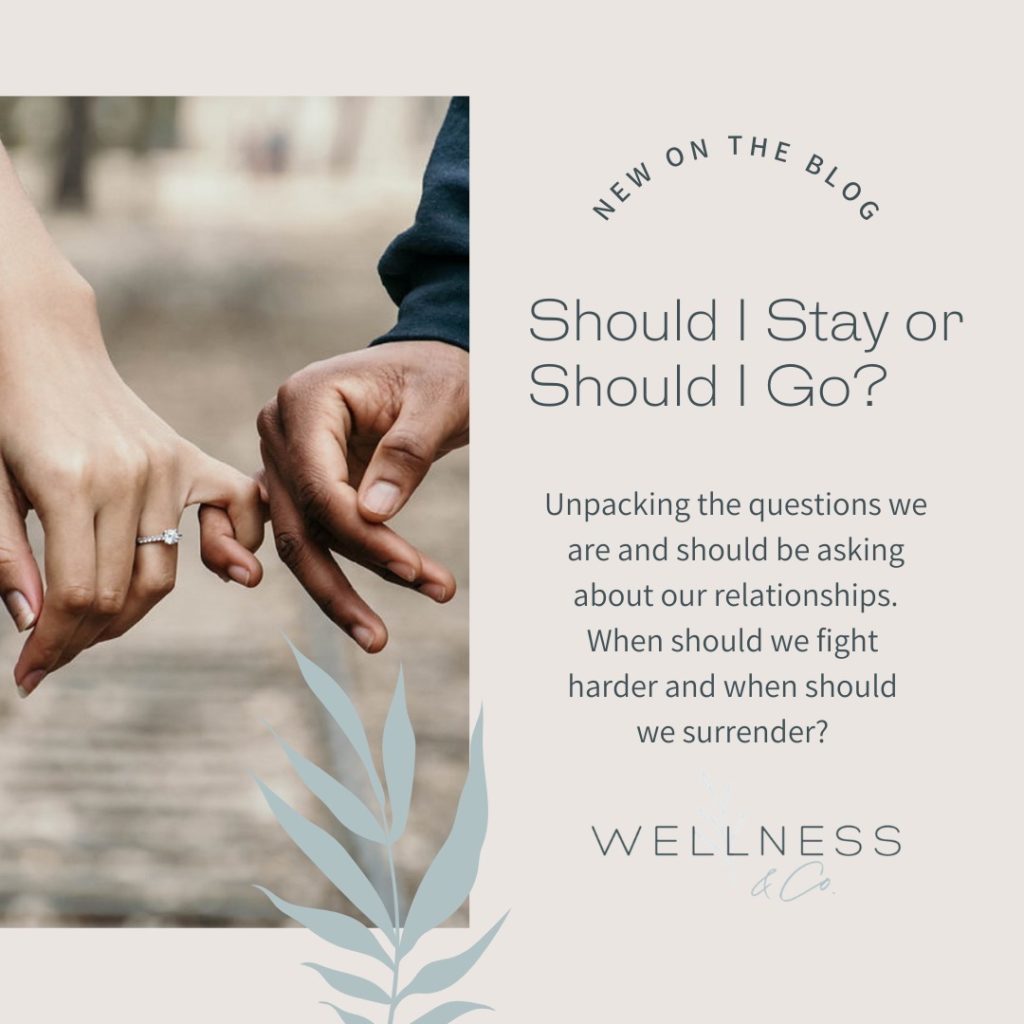Follow
Wellness & Co.
Hi, I'm Dr. K, Wellness & Co. is a growing therapy/coaching practice and educational hub for prospective clients based in Maryland and virtual clients all over the world!
Hi, I'm Dr. K
free guide
e -books
e -course
How to Decide If You Should Fight For Your Marriage
August 13, 2024

Dear Reader,
This author has only one pressing question. How do you respond to the betrayed, broken, fixated, and furious spouse demanding to know: “should I stay or should I go?”
If you recognize the introduction of this blog, or read it with the exact tone of Lady Whistledown, then you are out from under the metaphorical pop culture rock.
Bridgerton.
The super successful and scandalous Netflix series based off the romance novels of Julia Quinn.
It’s not just the notorious Lady Whistledown that I’m referencing in today’s post. It’s the scandal associated with the show that begs the question I receive quite a bit in my office:
What Actions Constitute Divorce?
To be honest, I didn’t entirely remember said “scandal” (spoiler alert!)
I was doing some late night reading (hello, breastfeeding) and was curious if there would be a Season 3 of Bridgerton. Phew, there is!
In my reading I stumbled upon a blog that referenced a controversial sex scene from Season One that left the public upset, to say the least. See this article for more details.
For those reading who are unfamiliar with the series and/or those looking for non-explicit content to watch – the series does have numerous scenes with nudity, particularly in the first season.
The scene that caused the uproar (reminder, spoiler alert!) involves the main character, Daphne, distraught over learning that her husband has been deceiving her by using the pull-out method to avoid conception. In return, in a future sexual encounter, she puts herself in the position of sexual control to prevent her husband from pulling out.
The public’s response: this is marital rape.
Are Betrayal, Toxicity, and Abuse Common in Marriage?
This got me thinking about how our culture often appropriately calls out and labels unhealthy, inappropriate, and abusive behavior yet negates the convoluted and dynamic aspects of healing, forgiveness, and recovery in interpersonal relationships.
The reality: many, many couples choose to heal from such devastating marital wounds as displayed in Bridgerton, even if we don’t see it on screen.
I am certainly not condoning marital rape. AND, the chair I sit in every day, across from hurting couples, is quite complex.
In fact, over the years I’ve developed an expertise in helping couples heal through infidelity, the result of countless inquiries of couples reaching for hope. This also led to me creating a brief e-resource for couples looking for a lifeline in the midst of their healing journey.
I’ve sat across from a myriad of couples where (details altered for client protection) a partner:
-fell in love with the others best friend,
-racked up 100k in credit card debt,
-had been secretly using illicit drugs,
-had an emotional affair with a former student,
-had secretly terminated a pregnancy,
-had exposed a secret, long-term addiction to porn,
-believed his one-night stands were not cheating,
-had rekindled an affair with an old colleague,
-had sexually harrassed and made advances toward a minor,
-had waited until marriage to reveal a Bipolar diagnosis,
-had gaslit and abused their partner for years,
-had lied about sharing the same faith perspective,
-and more…
Perhaps you are reading this list and thinking some of things are unforgivable. From your perspective, they are immoral, wrong, or disgusting.
And yet, my office is testament that countless couples experience these wounds and feel hurt, betrayed, confused, grieved and…
committed.

Is it Harder to Stay or Leave?
I once had a client say to me: “I think the harder choice is to stay.”
I’ve never forgotten that. The work involved in healing a betrayal, toxic cycle, or abusive relationship is demanding.
I’m not sure whether it’s actually harder or easier to stay after these experiences. I’m also not sure there is a standard for determining when “enough is enough” in the realm of hurt, betrayal, and abuse – every person and every partnership is different.
Certainly our culture has a line. In many cases, these actions are just plain wrong. In the eyes of our culture there is often no second chance and no forgiveness. Perhaps that should be the response to marital rape.
Have You Ever Wondered How to Determine If You Should Leave?
If you’re like the couples sitting across from me – or the lone partner who calls and leaves me a voicemail frantically wanting to know whether they should stay or go, I actually do have an opinion.
There are many reasons why someone chooses to stay (healthily motivated or otherwise): loyalty, vows, duty, image, stability, children, fear, fatigue, etc.
So let me clarify what my opinion is NOT. It’s not a summation or reflection of your values. Although, I am happy to explore value systems with clients/couples to determine whether their worldview aligns with staying or leaving. But broadly speaking, I’ll leave that to you. It’s up to you to determine whether your faith perspective, moral code, political leaning, etc. suggests a specific path forward.
My opinion, based on my expertise, however, does have a recommendation of one specific thing that can help you discern whether you should stay or leave.
This Single Reason Can Help You Decide if You Should Fight For Your Marriage
Inner work.
A deep commitment to inner knowing and exploration has immense potential to heal your relational wounds.
Essentially, your spouse should be less focused on defensiveness and more focused on curiosity.
Less focused on “leaving the past in the past” and more focused on using the past to understand the present.
Less focused on “aren’t you over this already? You can’t punish me forever” and more focused on “my choices will impact our safety and love-connection forever, I want to learn and hear more about your pain…”
Of course the context leading to the relational trauma will need explored.
All in all, healing a marital betrayal requires a commitment to inner work from BOTH people. If you, or your spouse, are stuck in the blaming phase you may need individual work prior to couples work.
From the mental health angle, without a commitment to inner work the partner(s) will likely cycle back to abuse, affairs, and addictions in some form or another.
With inner work your relationship can heal from the depths of despair. I’ve seen abuse be eradicated. I’ve seen infidelity beautifully forgiven. I’ve seen lying and deceit brought into the light and met with compassion and honesty.

You Cannot Convince Your Partner to do the Inner Work
Remember: they have to really want it. They have to desire to understand how they got here and be open to what it takes to heal.
Back to our scandal…
In the case of Daphne, likely her embarrassment around her sexual inexperience; her anger and hurt at her husbands deceit; and the societal expectations for women (and her own desire) to have children contributed to her forcing herself onto her husband.
In this situation, both parties need intentional inner work because the Duke also needs to explore his intergenerational trauma and why that led to a vow to never have children and subsequently, a willingness to deceive his spouse.
As horrific and wrong as these actions can be, some couples still choose the hard path of marital healing.
Have You Experienced Abuse, Deceit, Betrayal, and More?
If you are reading this and feeling like your marriage needs the support of (1) a space to do inner work and (2) a provider who can instill hope and prompt change, then we are here for you.
We have providers ready to walk alongside you as you heal through these unthinkable pains.
Dr. K started Wellness & Co. with the desire to provide top-notch therapy to our local community. Now, Wellness & Co., has therapists, coaches, tutors, and professional organizers – all to provide wrap-around, boutique style care to our clients. Dr. K specializes in couples therapy, healing from infidelity, and supporting individuals through relational transitions.
Leave a Reply Cancel reply
CONTACT
Start Here
BLOG
OUR TEAM
SHOP
ABOUT
©2025 Wellness & Co. | All Rights Reserved | Design by EverMint Design Studio
BACK TO TOP
connect with us on instagram
